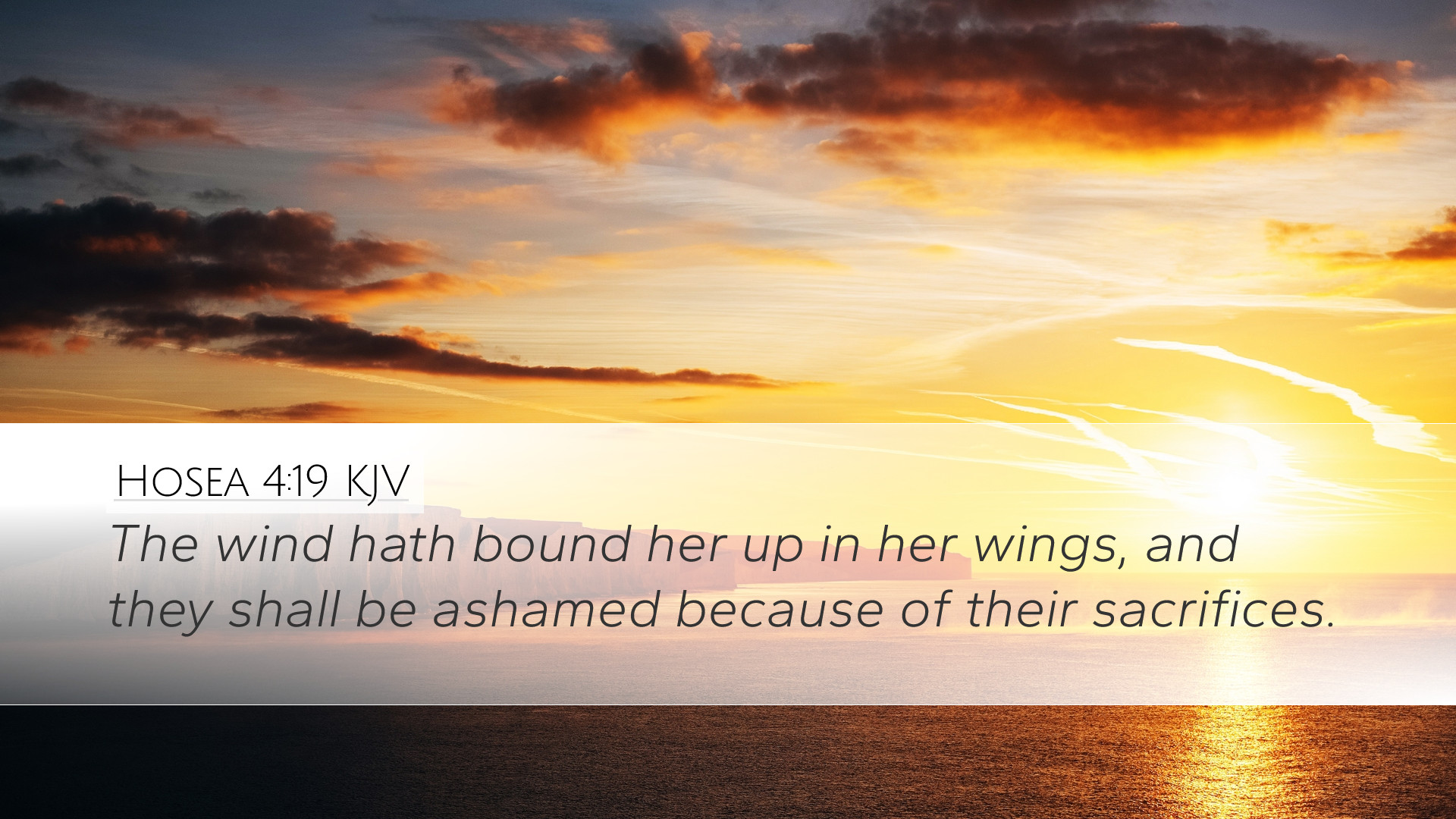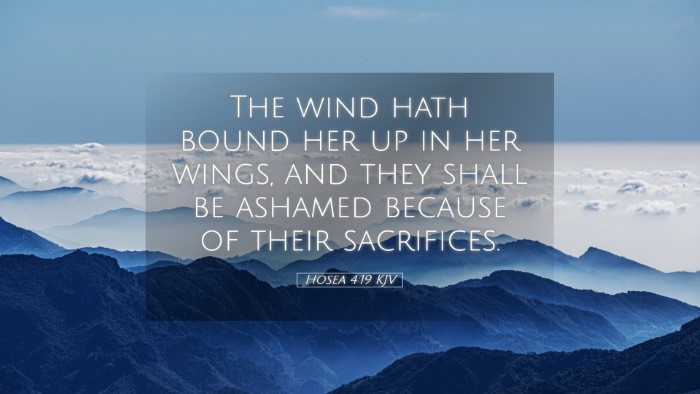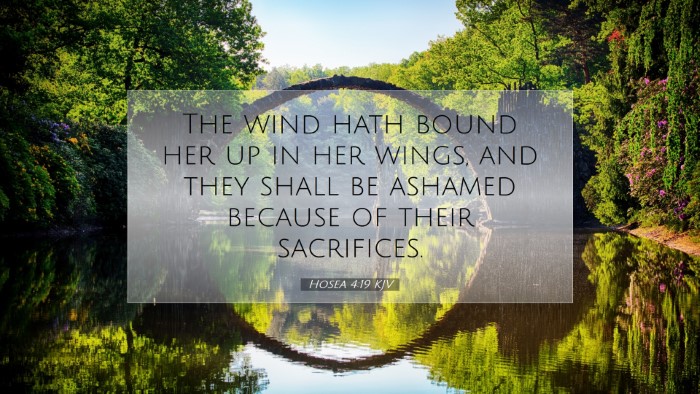Old Testament
Genesis Exodus Leviticus Numbers Deuteronomy Joshua Judges Ruth 1 Samuel 2 Samuel 1 Kings 2 Kings 1 Chronicles 2 Chronicles Ezra Nehemiah Esther Job Psalms Proverbs Ecclesiastes Song of Solomon Isaiah Jeremiah Lamentations Ezekiel Daniel Hosea Joel Amos Obadiah Jonah Micah Nahum Habakkuk Zephaniah Haggai Zechariah MalachiHosea 4:19
Hosea 4:19 KJV
The wind hath bound her up in her wings, and they shall be ashamed because of their sacrifices.
Hosea 4:19 Bible Commentary
Commentary on Hosea 4:19
Hosea 4:19 states, "The wind hath bound her up in its wings, and they shall be ashamed because of their sacrifices." This verse encapsulates the heart of the prophetic messages delivered through Hosea, illustrating themes of abandonment, judgment, and the futility of empty worship.
Contextual Overview
The Book of Hosea is primarily a narrative of God's enduring love for Israel, juxtaposed with Israel's chronic unfaithfulness. The prophet Hosea is called to demonstrate this divine relationship through his personal life, ultimately reflecting the tumultuous relationship between God and His people. In this particular chapter, God’s lament over Israel’s idolatry and rejection of His covenant is particularly striking.
Insights from Public Domain Commentaries
Matthew Henry's Commentary
Matthew Henry emphasizes that the phrase “the wind hath bound her up in its wings” serves as a metaphor for the judgment that is about to befall Israel. He interprets the 'wind' as a symbol of the impending destruction that will sweep through the nation due to their unfaithfulness.
Henry notes that the term “wings” indicates something that should have been protective but instead becomes an agent of devastation. This reflects the dual nature of God’s protection and judgment, highlighting how the very source of grace can transform into the source of wrath when one turns away from God.
Albert Barnes' Notes on the Bible
Albert Barnes takes a slightly different approach by focusing on the societal implications of Israel’s spiritual decay. He observes that the “sacrifices” referenced in the verse are useless when offered with impure motives. The worshipping community was engaged in rituals while being morally bankrupt. Barnes argues that this point leads to the understanding that religious observance devoid of true faith and repentance renders God’s judgment inevitable.
Furthermore, he interprets the shame mentioned in the verse as a revelation of the impotence of their gods and practices when faced with God's righteous judgment. The sacrifices, meant to signify devotion, instead become a point of shame for those who think they can deceive God.
Adam Clarke's Commentary
Adam Clarke offers a detailed analysis of the imagery in the verse. He posits that the “wind” does not merely signify an external force but symbolizes the instability and turmoil that characterize a nation that has forsaken its covenant with God. Clarke reflects on the historical context, noting that Israel had turned to idolatry and false security in treaties with foreign powers instead of trusting in the Lord.
In his examination, Clarke emphasizes that the reference to being “ashamed” serves as a stark reminder of the consequences of abandoning faith in God. He suggests that this shame is a foreshadowing of the greater disgrace that will accompany the nation's eventual downfall, underscoring the notion that one cannot mock true engagement with the divine without facing judgment.
Theological Reflections
The theological weight of Hosea 4:19 is profound. It serves as a reminder that true worship must stem from a genuine relationship with God rather than mere ritualistic practices. The metaphorical 'wind' speaks to the reality of external pressures and the internal chaos that arises when one is detached from divine purpose.
Implications for Worship
- Integrity in Worship: This verse calls for introspection regarding the integrity and authenticity of one’s worship. It challenges the notion that God understands and accepts worship devoid of true commitment.
- Judgment on Hypocrisy: It addresses the heavy judgment on hypocritical practices—offering sacrifices from a heart that is unrepentant or detached from God leads to inevitable shame.
- Restoration and Reconciliation: Ultimately, while judgment is pronounced, the prophetic voice also yearns for reconciliation. God’s desire is to restore Israel despite its failed commitments, which resonates with modern believers facing their own brokenness.
Conclusion
Hosea 4:19 serves as a powerful indictment against false worship, emphasizing the necessity of authenticity in one’s relationship with God. The commentaries of Henry, Barnes, and Clarke provide deep insights that enrich our understanding of the text and challenge believers to maintain a true heart of worship. As one reflects on this passage, may it call forth a spirit of repentance, urging a transition from mere practice to profound devotion. This call to authenticity is timeless, essential for both ancient Israel and contemporary faith communities.


